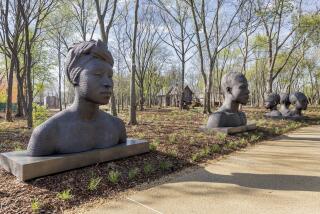The Faces of Slavery
- Share via
In their own words, black men and women remember slavery. They put a face on an institution often objectified, dismissed as ancient history.
These Americans make the connection between the past and future in “Remembering Slavery: African Americans Talk About Their Personal Experiences of Slavery and Emancipation,” an audiotape set with companion book, now available in book stores.
This is not black history. This is U.S. history. The Emancipation Proclamation freed enslaved black men, women and children only 135 years ago, in January of 1863. In the 1930s and ‘40s, workers from the Federal Writers’ Project interviewed thousands of former slaves and preserved their recollections of bondage, the Civil War and, finally, freedom.
These elderly men and women, some by then centenarians, recall childhoods on the plantations, old masters, working hard chopping cotton, plowing and hoeing in the fields, feeding the stock, hunting, cooking, the whippings and other punishments, family members sold away without even a goodbye, never to be seen again, leaving with nothing. Some remember the Yankees in blue uniforms and “colored” troops.
George Washington owned slaves, and he was not the only U.S. president who, in contradiction to the freedoms for which the colonialists fought, owned human beings.
“My grandfather belonged to Thomas Jefferson,” Fountain Hughes told an interviewer in 1949. He was 101 years old. “Wasn’t no schools. When they started the little school, people that were slaves couldn’t many of them go to school ‘cept they had a father and mother. My father was dead. My mother was living and she had three or four other little children. She had to put them all to work to help take care of the others. We didn’t have no property. We didn’t have no home being slaves all our lives. My mother was a slave. My sisters were slaves. My father was a slave.”
This dramatic documentation is newly accessible in remastered audio recordings and transcripts from the Works Progress Administration arts project. The recordings, used in a recently broadcast public radio documentary for Smithsonian Productions, give intimacy to a history that many Americans would rather forget. Our country’s history of slavery is available for those willing to look, listen and learn: on the movie screen, in Oprah Winfrey’s “Beloved”; on television, in the just completed PBS four-part documentary “Africans in America: America’s Journey Through Slavery.” A companion book to the PBS series traces the saga through the eyes of slaves and slaveholders, from the 1619 arrival of the first Africans.
Why remember slavery? It happened so long ago. No living American was either slave or slave owner. Yet it will never be forgotten, and never should be. This bitter period of our history holds answers and insights to an enduring dilemma: America’s unfinished business on race.
More to Read
Sign up for Essential California
The most important California stories and recommendations in your inbox every morning.
You may occasionally receive promotional content from the Los Angeles Times.













